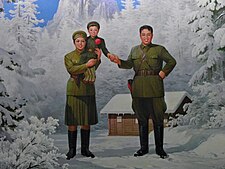Kim dynasty (North Korea)

|
|
| Current region | North Korea |
|---|---|
| Place of origin | Mangyongdae, Pyongyang, Korea |
| Members |
Kim Il-sung Kim Jong-il Kim Jong-un |
| Distinctions | Leaders of North Korea |
| Estate | Residences of North Korean leaders |
| Name origin and meaning | "gold" |
| Kim dynasty | |
| Hangul | 백두혈통 |
|---|---|
| Hanja | |
| Revised Romanization | Baegdu Hyeoltong |
The Kim dynasty, officially called Mount Paektu Bloodline, is a three-generation lineage of North Korean leadership descending from the country's first leader, Kim Il-sung, in 1948. Kim came to rule the North after the end of Japanese control in 1945 split the region. He began the Korean War in 1950 in an attempt to reunify the peninsula. Kim developed a cult of personality closely tied to their state philosophy of Juche, which was passed on to his successors: his son Kim Jong-il and grandson Kim Jong-un.
In 2013, Clause 2 of Article 10 of the new edited Ten Fundamental Principles of the Korean Workers' Party states that the party and revolution must be carried "eternally" by the "Baekdu bloodline".
Unlike governance in all other Communist countries, North Korea's governance is comparable to a royal family. The Kim dynasty has ruled North Korea since 1948 for three generations, and still little about the family is publicly confirmed.Kim Il-sung rebelled against Korea's Japanese rule in the 1930s, which led to his involvement and training in the Soviet Union. Korea was left divided after Japan's post-World War II withdrawal in 1945, and Kim came to lead the Soviet-backed North's provisional government, eventually becoming the first premier of its new government, the Democratic People's Republic of Korea (commonly known as North Korea), in 1948. He started the Korean War in 1950 with hopes to reunify the region.
Kim developed a personality cult that contributed to his uncontested 46-year rule and extended to his family, including his mother Kang Pan-sok (known as the "mother of Korea"), his brother ("the revolutionary fighter") and his first wife (the "mother of the revolution"). The strong and absolute leadership of a solitary great leader, known as the Suryong, is central to the North Korean ideology of Juche. Four years after Kim Il-sung's 1994 death, a constitutional change wrote the presidency out of the constitution and named him as Eternal President of the Republic in order to honor his memory forever. Kim Il-sung was known as the Great Leader, and his eldest son and successor, Kim Jong-il, became known as the Dear Leader and later the Great General.
...
Wikipedia
